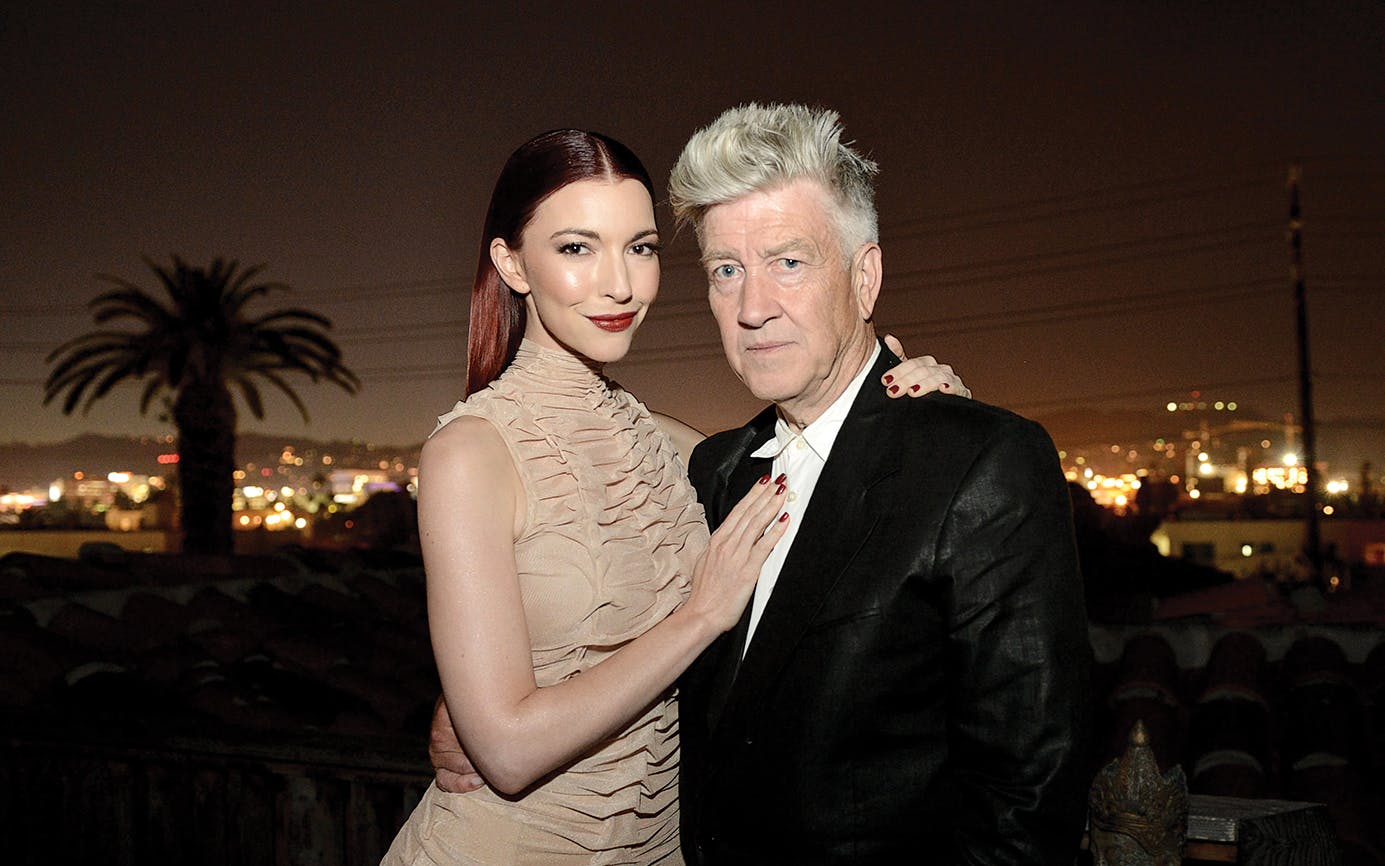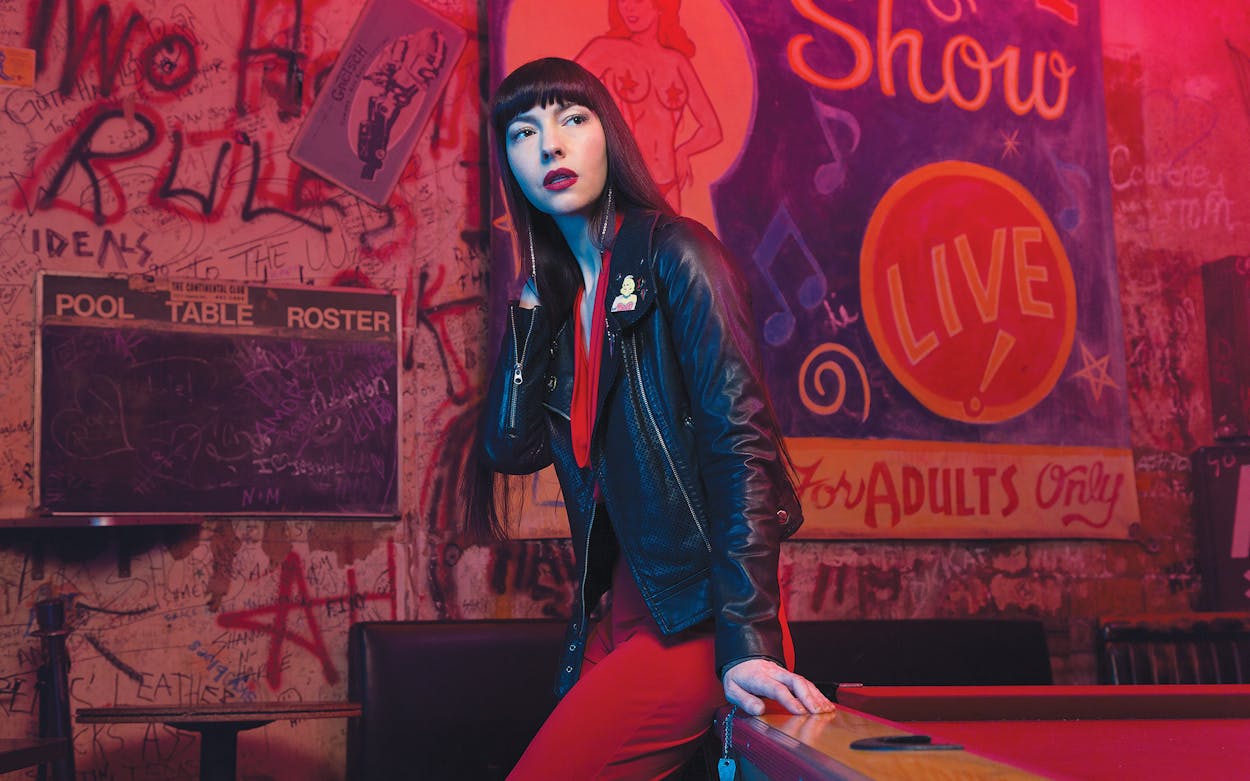Among Chrysta Bell’s many eccentricities is the origin of her name. As the 41-year-old singer-songwriter tells it, her mother had discovered the nineteenth-century English poet Samuel Taylor Coleridge’s haunting ballad “Christabel” while in high school and was drawn to its story of a devout girl who forges a mysterious bond with a beguiling demon. Years later, when the singer’s mother was pregnant, she heard a voice from her womb instruct her to christen the child after Coleridge’s benighted heroine. Chrysta Bell, her mother claims, had named herself.
In light of this supernatural provenance, it’s appropriate that Chrysta Bell—she goes by her full first name—and I meet on a chilly Saturday afternoon at a cemetery on her family property in La Vernia, a rural outpost twenty miles east of San Antonio. She welcomes me with a hug and ushers me through the harlequin wildflowers and grave markers, pointing out those belonging to the Beall family, the cemetery’s original occupants, and the recent plots that hold her father and a close friend of hers. Now named Countryside Memorial Park, the small cemetery and the property on which it sits were bequeathed to her by her father and are now presided over by her mother, Sunny Markham, who lives on the premises. The cemetery is very much a family affair, though burial plots are open to anyone. Countryside is part of the growing green cemetery movement, which promotes home funerals and burials conducted without the use of embalming and nonbiodegradable materials. For Chrysta Bell, the graveyard also serves as a sanctuary, far from the urban currents of her present home in Oakland, California.
As we look out on the graveyard’s overhanging live oak trees and the pasture in the distance, she discusses the intimate details of a recent funeral—accepting the delivery of the body bag, unveiling the remains, and anointing and singing over the corpse. “It was a profoundly healing experience, spending time with the vessel once the spirit had left it,” she says. Her reflections on the ceremony contain such compassion for the dead that, with her eyes wide and fair skin glowing in the sunlight, she seems to conjure up the likeness of her eponym praying beneath an oak tree: “The lovely lady, Christabel / Whom her father loves so well / What makes her in the wood so late, / A furlong from the castle gate?”
On the eve of a three-week European tour, Chrysta Bell has returned to San Antonio from California, where she has lived on and off for fifteen years. She is perhaps best known for her work with David Lynch, with whom she has collaborated for nearly two decades. They recorded one album together before Lynch cast her in 2017’s Twin Peaks: The Return as FBI agent Tammy Preston—perhaps not coincidentally a protégé of deputy director Gordon Cole, played by Lynch himself. Yet however Lynchian or otherworldly Chrysta Bell’s music often sounds, it remains deeply rooted in the Texas of her youth. She says her new album, Feels Like Love, recorded in Austin and San Antonio, draws inspiration from a nostalgia for the place of her birth and its “big, endless sky.”
She was born Chrysta Bell Zucht to a bohemian San Antonio couple who divorced when she was young. Her mother was a singer/performer; her father, A. D. Zucht, was by turns a dentist, a hot air balloonist, a hotelier, and a president of the local Bachelors’ Club. (This magazine once ran an item about the fact that he had a hot tub in his dental office.) Her eclectic background was, in short, the kind that set her on a divergent path.
“I was never the popular girl in school,” she says after she, her mother, and I sit down for dinner at San Antonio’s Liberty Bar. “I was always the one doing talent shows or musical theater.” Her informal education had begun early on, while she watched Sunny make ends meet by delivering singing telegrams, a profession harking back to a different era. Eventually, her mother and her stepfather, Mitchell Markham, built Emerald Studios, a recording facility that specialized in commercial advertisements. A teenage Chrysta Bell spent many days in the booth, where she sang jingles for SeaWorld, Fiesta Texas amusement park (“¡Lo mejor de Tejas! A town built just for fun!”), and Dubuque hot dogs (“Wouldn’t you like to have me for lunch?”). It was there she discovered her talent for infusing emotion into lyrics and taking direction quickly. After a role in the local artist Gordon Delgado’s short film Jesus in a String Bikini brought her to the attention of Hong Kong martial arts director Sammo Hung, she was cast as a Native American “squaw” in the 1997 film Once Upon a Time in China and America, shot in South Texas.
“I was playing opposite Jet Li, and I was clearly not Native American,” she says. “So I spent three hours in makeup every morning. But Sammo wanted me for the part.”

Due in part, no doubt, to her arresting appearance, Chrysta Bell has always attracted the attention of older men. Her mother recalls an encounter at the very bar we’re sitting in with a man purporting to be an artist who approached her and Chrysta Bell’s father and requested their permission to paint her portrait. “This guy said, ‘She’s so beautiful,’ ” Sunny recalls with eyes rolling, “and we said, ‘Yeah, yeah—we know.’ ” They dismissed his advances before learning from bar staff that the man was George Yepes, the celebrated Chicano muralist. Chrysta Bell later appeared as one of the faces in his celebrated series of Madonna paintings.
With no other acting roles forthcoming, Chrysta Bell moved to Austin in 1997 to expand her creative circle. Although she harbored dreams of movie stardom, her primary love was music. By a stroke of luck, her first audition was to be the lead singer of 8 ½ Souvenirs, a gypsy jazz band whose vocalist had just left. She immediately caught the ear of yet another older man, the group’s manager, Jack Hazzard, a silver-haired bon vivant who co-owned the Continental Club and had made 8 ½ Souvenirs his pet project.
“Most of the band was on the fence, but Jack put his foot down,” Chrysta Bell says. “He told them, ‘This is the girl.’ ” Chrysta Bell had little training in jazz, but her exuberance and the lilt of her mezzo-soprano brought a new level of excitement to the band’s music. “I was eighteen, and they were around forty,” she says, remembering her youthful naivete. “I wasn’t cultured and trained in their world. I would sing [Cole Porter’s] ‘It’s All Right With Me’ and say, ‘Wow, you guys write great lyrics!’ ” When the band was booked on Austin City Limits, she assumed it was a local public-access show with a kitschy set. “I was just having a great time,” she remembers. “I got a real education.”
One of her earliest fans was film director Robert Rodriguez. “I could sense there was a star quality to her,” he remembers. “She could draw in an audience like no one I’d ever seen. I couldn’t believe she was from San Antonio, as I was, because she seemed so much from somewhere else.”
In 1998, the height of the decade’s swing revival, 8 ½ Souvenirs signed with RCA Victor and appeared destined for bigger things than Austin. The band toured with the Brian Setzer Orchestra in the fall of that year and performed with Willie Nelson at his annual Fourth of July picnic at Luckenbach. Their subsequent two albums, Souvonica and Twisted Desire, featured sophisticated takes on hot jazz standards as well as original compositions. But by 2000 the group imploded, a result, Chrysta Bell says, of RCA’s pressure to make them sound less like Django Reinhardt and more like FM radio. “My bubble was burst,” she says. “I had been signed when I was nineteen years old. I had been coddled by RCA, ridden around in limos, with signing bonuses. I thought it was only up from there.” Fortunately, she had come to the attention of high-profile music manager Bud Prager, who had represented Foreigner and Megadeth. Although Chrysta Bell says that Prager loathed jazz, he believed that she was a star in the making and set up a meeting with the heavyweight talent agent Brian Loucks, who was known for making connections between the film and music worlds. He instantly offered to introduce her to David Lynch.

@*&% You, Tammy!
In Twin Peaks: The Return, Laura Dern’s character yells an expletive at Chrysta Bell’s character, and the phrase quickly became a meme among Tammy fans and haters—and the name of a New York City–based Twin Peaks tribute band.
If Chrysta Bell had once nursed fantasies of collaborating with a major Hollywood director, she could have dreamed up no better match than David Lynch. She fondly recalls the disheveled director meeting her at the front door of his Hollywood Hills home recording studio. “It was love at first chord,” she jokes. “It was immensely helpful to have grown up in a recording studio, because I was totally at home when I met David.”
Lynch, speaking by phone from Los Angeles, waxes similarly metaphorical on his first impressions of Chrysta Bell. “Into the recording studio came this creature,” he says. “Chrysta Bell was so much like an alien that first day.” Later he invokes the imagery of a light-blue songbird and then a praying mantis. “Her neck kind of stretches out. And her arms stretch out,” he recalls.
At the time, Lynch and his recording engineer were working on a track that needed a vocal melody. “She found the melody, and we had a great day working together,” he says. At the end of that first session, Lynch made an astonishing offer: to work with her on an entire album. Chrysta Bell, however, was still tied to her contract with RCA. “It kind of threw cold water on everything,” she admits. By the time she exited the record company, Lynch was off to direct Mulholland Drive, putting their proposed project in temporary limbo.
Without a recording contract, Chrysta Bell began traveling between Texas, where she played with various indie bands, and Los Angeles, where she had joined the performance troupes MASS Ensemble and Soul in the Machine. Their concerts featured oversized, homemade instruments and elaborate choreography and were often performed for exclusive audiences at Fortune 500 retreats, Las Vegas resorts, and, on one occasion, a birthday party at Michael Jordan’s Bahamian mansion. She remembers having to perform with perfect timing in adverse conditions, including dancing near exposed fire and singing while partially submerged in water. “The shows required extreme precision and professional execution,” she says.
They were the total antithesis of her musical experiences with Lynch once their decade-plus collaboration began again in earnest a few years after their initial meeting. “With David it was completely about intuition,” she says. “He was always about the feeling of the music.” She chuckles as she describes the sort of directions that he would give her to inspire a performance: “He would say things like, ‘It’s midnight. You’re driving to your lover’s house, and she’s been real bad. You’ve got a fifth of whiskey in the glove box and a gun on the seat. There’s a full moon, and you’re driving way too fast. Now go!’ ”
“It’s an old way of doing things,” Lynch explains. “You can paint a picture, and the voice comes out a little differently.” He repeats a story that he once heard from Roy Orbison as an illustration. “He told me that they used to have a guy in the studio who would come remind him of the thing that got him to write the song to begin with. Much like a film director. To make him see these images and affect the way he sang.”

While the recording sessions continued at a fitful pace, four years with MASS Ensemble and Soul in the Machine had tired Chrysta Bell of performing as a hired gun. She was eager to release the music she and Lynch were making. “The record took forever,” she says. “Some songs, like ‘Swing With Me,’ took three hours to finish, and some, like ‘Down by Babylon,’ took seven years. But David would tell me to be patient.” In 2011, the nostalgically titled This Train was finally released, on her own label, La Rose Noire. The album was an intriguing fusion of Lynch’s studio experiments and Chrysta Bell’s sultry vocals, from the title track’s chugging, nocturnal blues to the remarkable spectral aria “Polish Poem,” which had first appeared in the closing minutes of Lynch’s 2006 film Inland Empire.
Only weeks after her 2017 debut as Agent Preston in Twin Peaks: The Return, she released her follow-up album, We Dissolve. Helmed by Bristol, England–based producer John Parish, best known for his work with PJ Harvey, the album showcased Chrysta Bell’s songwriting with tighter, more rock-oriented arrangements. Parish believes the record was a necessary step in cultivating Chrysta Bell’s own voice. “I am a massive fan of David Lynch,” he said in an email, “but he has such a strong and recognizable aesthetic that it can be hard to stand apart. It was important for her to establish herself, to show that she could make a great record on her own terms.”
All of which has led up to Feels Like Love, an album written and recorded in Texas over the course of a year and a half with Chrysta Bell’s songwriting partner and producer, Chris Smart. The record marks a surprising shift in her musical direction—it has neither the bluesy exotica of her Lynch collaborations nor the noirish rock of the Parish album. In fact, Feels Like Love, much of which comprises disco and post-punk numbers, is the most pop-oriented record in her discography, reflecting a youthful vivacity and love for the home she left behind years ago.
“I had to go off to California and experience Hollywood and get all of that enrichment, frustration, and elation, then go to England and record in the cold,” she says. “I took these lessons and tools from across the world and have come home to put everything I’ve experienced into the music.” For all of her Lynchian otherworldliness, themes of homecoming return over and over in her descriptions of the record’s spirit. “There was a pureness to the album that wasn’t through any filter except a recording studio in San Antonio, Texas. The sky was the limit.”
Earlier in the day, as we strolled through the Countryside field, Chrysta Bell pointed to a spot near her father’s grave that was blooming with purple and yellow wildflowers. This is where she plans to be buried one day. Like both Lynch and the Christabel of verse, she seems spellbound by the mysteries of death and the supernatural. “Who wouldn’t want to end up here? It’s so beautiful,” she says serenely as a gust of wind whistles through the live oak and sends her hair momentarily skyward. Until that time comes, the mysterious singer with the heroine’s name and the Texas graveyard will serenade us with music from the other side.
This article originally appeared in the May 2019 issue of Texas Monthly with the headline “The Siren’s Song.” Subscribe today.
- More About:
- Music







